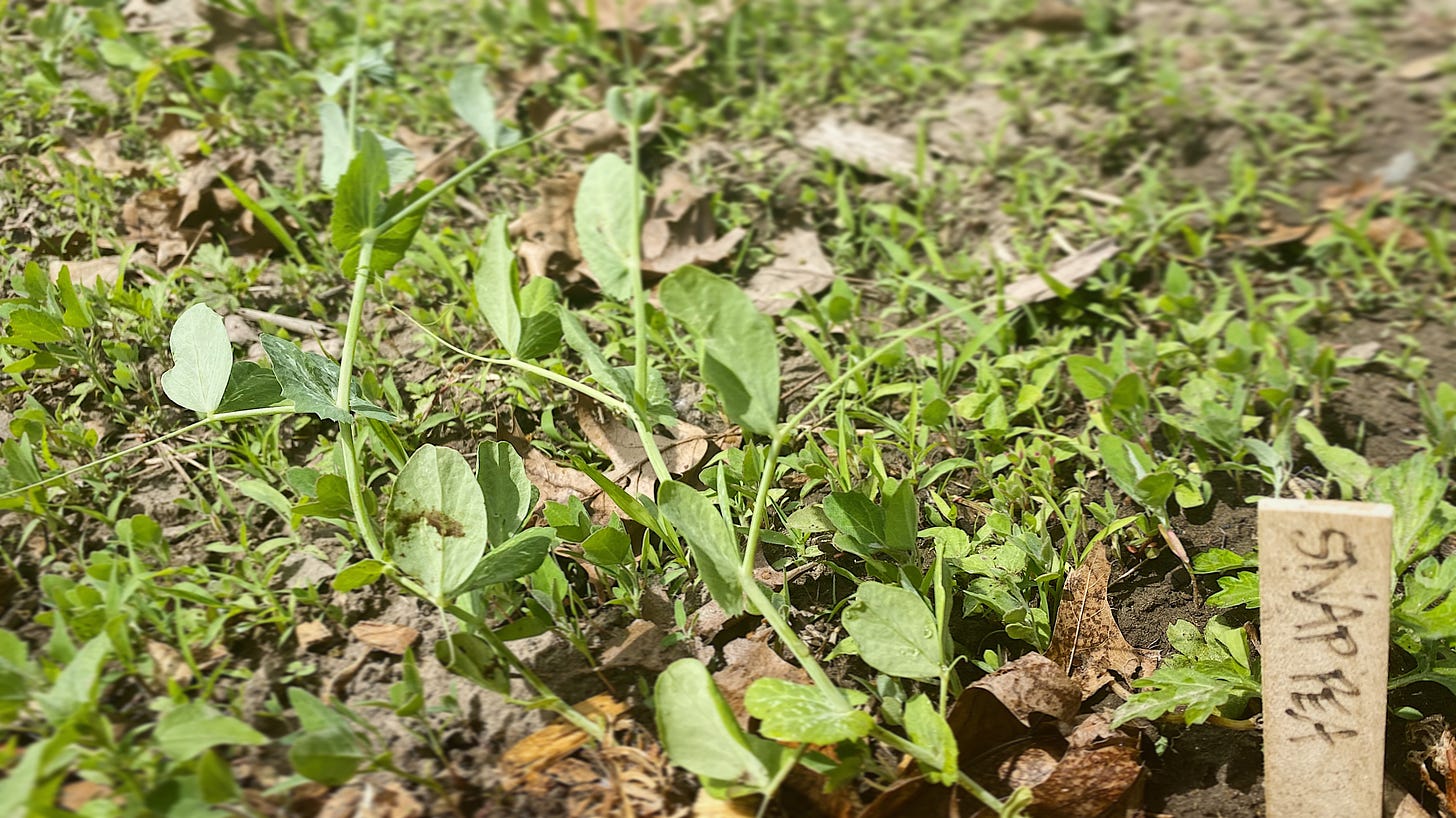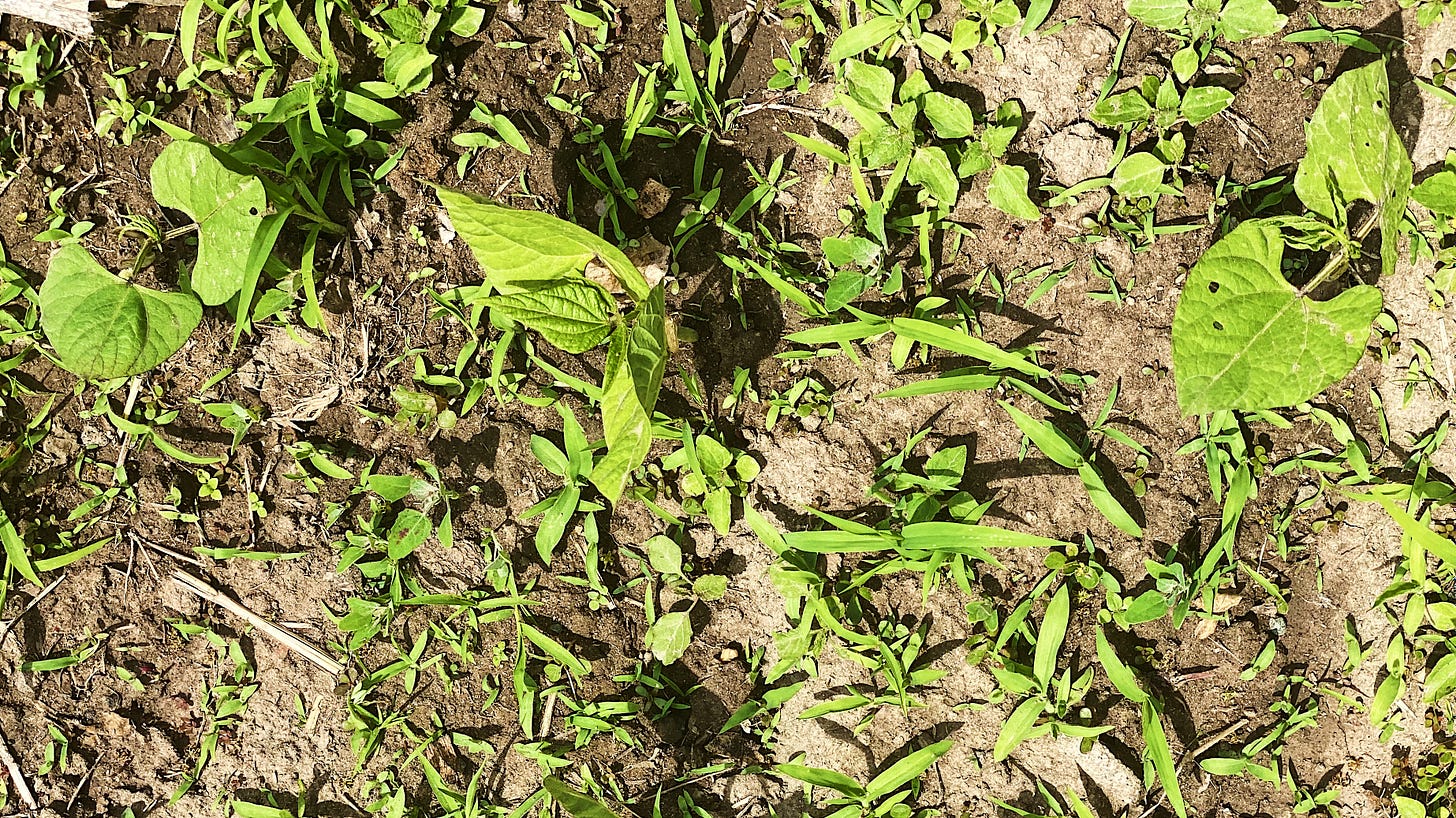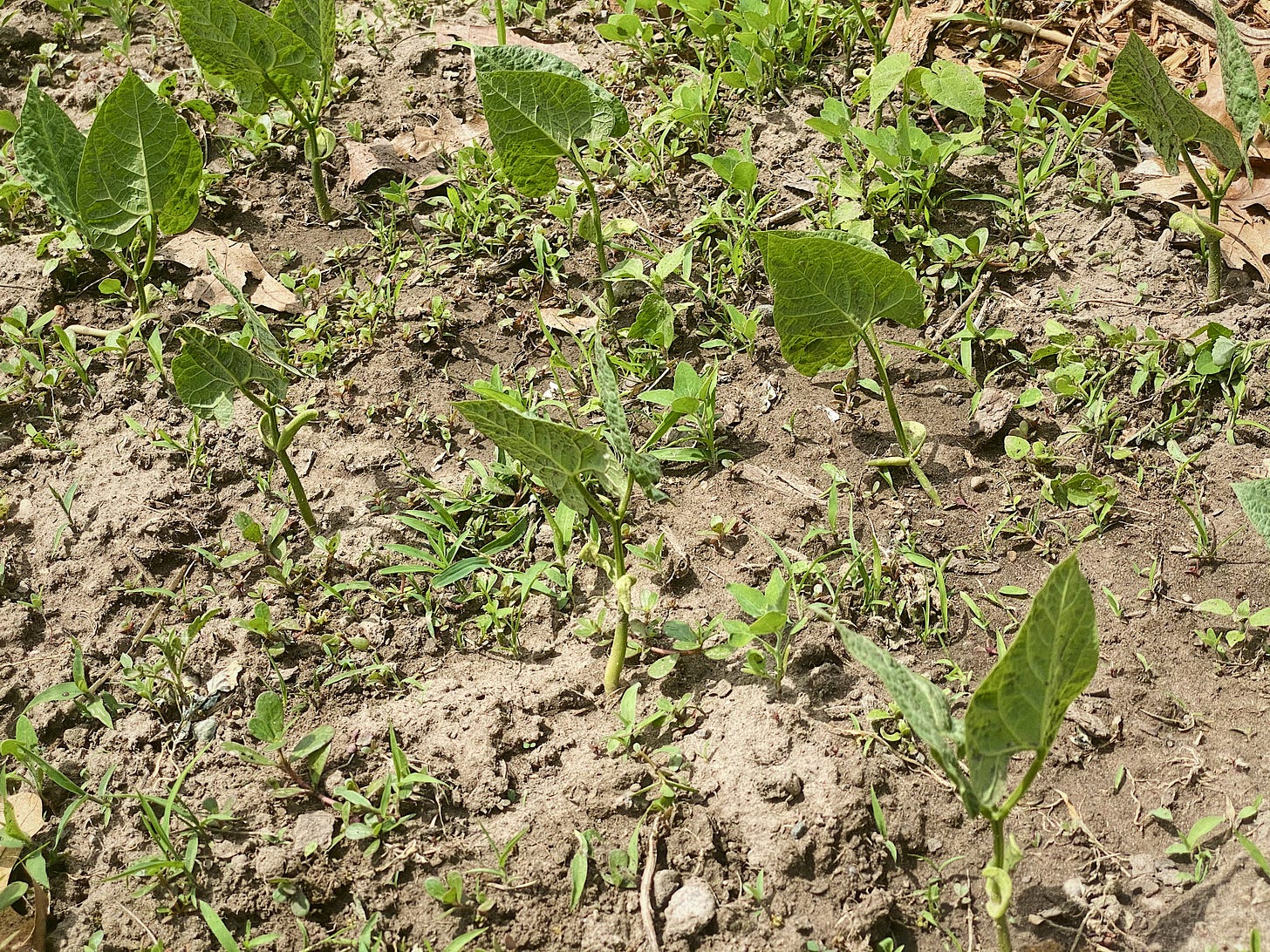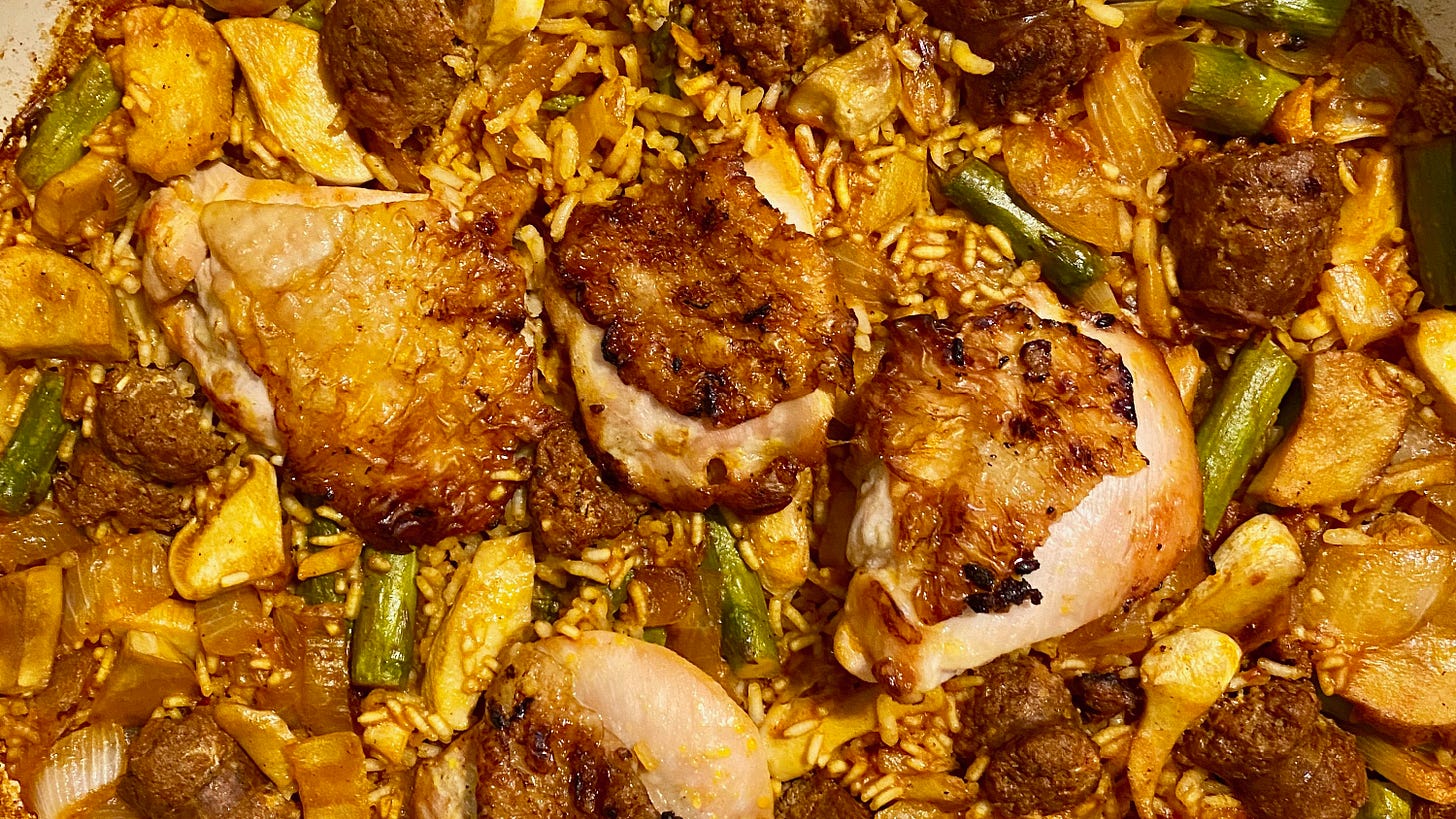Nobody Ever Gardens Alone
Some fragmented thoughts on doubt, certainty, friendship, pole beans, bad education, and somehow surviving this life together
The 10th Day after Coronatide*
Grand Rapids, Michigan
Hey, friend.
The other day, I was trading messages with a parishioner about doubt. A cloud had grown into a storm system, and she couldn’t even glimpse sunshine anymore. She felt she couldn’t believe wholeheartedly, so she wondered whether she could believe at all.
What she craved was certainty, but instead she had faith. I could read it in the pauses between her sentences, in the barely visible contrails after her thoughts, indeed in her desire to have a conversation at all. Since faith, according to the Letter to the Hebrews, is “the conviction of things not seen”—things you can’t prove, things you can’t know beyond a shadow of a doubt—maybe doubt doesn’t have to be an enemy. Maybe, I suggested, doubt can even be a friend. Maybe it can keep us searching and growing, asking good questions and seeking better answers. Maybe it can remind us of who we—which is to say, humans always trying to understand our story—and whose we are—in other words, part of a bigger story than our own.
Whenever I forget this, there’s always the garden to remind me.
Fozzie and I headed to the community garden on Tuesday afternoon to see what’s going on in our plot. (I sound ridiculous when I attribute intent to Fozzie, but please indulge my fantasies. I know all he ever really wants to do when he leaves the house is to pee, poop, eat things he shouldn’t eat, and hunt for cats and rabbits.)
As I said the other day, the potatoes are thriving. The tomatillos and pepper plants I’ve already transplanted seem healthy. The yellow squash and zucchini are persevering, the bok choy is meh. My spinach, though, is the picture of pathetic, and I’m not sure why; I’ve never struggled with it before. And then there’s the choy sum, a staple of the Chinese table... at least there should be choy sum. Where is it? Unclear.
Trying to grow things has probably taught me the greatest lessons I’ve ever learned about appropriate surrender. There has to be hope, because without it, who would ever sow any seed at all? There has to be intention; I amend the soil, I weed, and I water, as diligently and as faithfully as I can. But there will always be doubt: I think I’m doing the right things and I want to be doing the right things… but am I really doing the right things? I never really forget that so much is beyond my control.
It struck me as I was visiting the different plants that the term “community garden” is true not just of the larger, four-acre expanse but also of my small plot. Scattered throughout my rows, which, despite my best intentions, have turned out to be as straight as I am, are evidence that I haven’t done any of this alone.
The seeds for the Amish snap pea in the far northwest corner were sent by my friend Kristen as a welcome-to-Michigan gift. They’d never failed her, she told me. We all need something that won’t fail us right now, so I planted them with gratitude.

(Yes, I know there are lots of weeds. Yes, I thought about weeding before taking a photo. Yes, I’m trying to live into my conviction that shame isn’t a core farming value.)
The seeds for the rattlesnake pole bean in the next row over came from dear Barbara, who farms in Georgia with her husband.

Barbara also sent seeds for French climbing bean and Burgundy okra, with the caveat that her husband didn’t think the okra would grow in Michigan. Tristan and I love fried okra. I fell in lust with the idea of frying okra that I’d grown myself. We all need to dream of unlikely outcomes, so I planted the okra along with the beans.
Then there are the Potawatomi pole beans.

Generations ago, the Potawatomi lived in this part of what’s now called Michigan. Along with the Ojibwe and Odawa, they called themselves the People of the Three Fires—three brother tribes that spoke closely related languages and migrated from a legendary homeland called Turtle Island. Not far from here, they grew corn, beans, and squash as well as peas and pumpkins.
I grew up with your standard-issue schooling on Native Americans, which is to say it was Thanksgiving-focused and more historical fiction than true history. In adulthood, I began to glimpse the breadth and depth of indigenous cultural diversity in North America. In my thirties, I heard my first land acknowledgment. I didn’t know the word “Potawatomi” until a couple of years ago; even more recently, I learned to pronounce it without stumbling. (If you haven’t read Native, by Kaitlin Curtice, a citizen of the Citizen Potawatomi Nation, please do.)
The seeds for the Potawatomi pole beans came from a small outfit called Truelove Seeds in Philadelphia, which works with some three dozen farmers—many of them Black and Indigenous—to produce rare and heirloom seeds. As they wrote on their blog not too long ago, growing seeds isn’t just about the plants themselves. It’s also about community and honoring and preserving culture. It’s “racial and economic justice work, taking back the land, and growing culturally significant, accessible, delicious, healing food.”
We’re all searching for meaning, so I planted the Potawatomi pole beans because I’m obnoxious and can’t just let a garden be a garden without trying to add extra meaning. I wanted to honor the land’s heritage. I wanted a horticultural shoutout to my friend Kaitlin. And I wanted a tangible reminder that, for so long, I was thoroughly uneducated about a huge part of the history of these soils we now call the U.S.A.
I can’t blame anyone else for my bad education. Maybe when I was a kid I could have said that the system failed me. Now that I’m allegedly an adult human, the education system that really failed me is the education system that I constructed myself. Having spent more than four decades walking this earth, I have to own that for many years I chose to be uneducated. I chose not to read. I chose not to learn. I chose not to listen. The books, the lessons, the voices—they were all there, waiting for me to care.
Even if these beans flourish, I also know that this is just one growing season, just one crop. I have choices to make then, too, about what happens next. At the Farminary, where I learned to grow things, we rarely saved seed. But that means we neglected a crucial part of the growing process. If I believe the sacred story that I drone on about—that God has already written the story of life, death, and resurrection into creation itself—maybe I should focus not just on the life and the death that comes in one season but also the possibility of new life that comes with saving seed for the next.
Imani Perry, a professor of African American studies at Princeton, published a beautiful piece in The Paris Review last week about tending microgreens and hope on her nightstand. Just as I intend my bok choy and choy sum to connect me with my ancestors, she writes about how her bedside garden connects her to hers. Those ancestors, amidst exploitation and slavery, insisted on cultivating tastes of joy and morsels of pleasure, and this insistence still teaches their descendants. “Our gardens must grow,” she wrote. “That is a metaphor and a literal truth. When the bruised and battered seek refuge from the storm, may all of us who believe in freedom remain ready to feed and sustain them.”
Hope, intention, and doubt. Past, present, and future. Sorrow and suffering, dreams and possibilities— All were abundant in Perry’s gorgeous prose. Thank God we don’t have to navigate any of it alone. Whether it’s growing or planting, feasting or believing, we do it together—together with our ancestors, together with our friends. I can’t imagine any other way. How could we survive any other way?
What I’m Cooking: We made paella on Sunday night. It’s a versatile dish. You only need one pan. It’s done in under an hour. It’s gluten-free. You can make it vegetarian if you want to. Ours had chicken and chorizo as well as Michigan-grown asparagus and meaty nebrodensis mushrooms that we got from the mushroom man at the farmers market. It makes superb leftovers too; the other day, we microwaved some and then topped it with a fried egg for lunch. I’m still tinkering with my semi-recipe, but if there’s interest, I’ll make it a couple more times (Tristan won’t mind) and share it soon.

What I’m Reading: Who am I kidding? My attention span right now is shorter than a mayfly’s childhood. Other than Imani Perry’s essay, I’ve barely read a thing. I spend too much time on Instagram; an Insta caption is about all I can manage to read. (By the way, Fozzie is on Instagram now. You can follow him at @fozziefozz.)
What I’m Listening To: I love the cover of “Light of a Clear Blue Morning” (written by Dolly Parton! arranged by the Wailin’ Jennys!) that Melissa Greene, Lauren Pilny, and Ryan Greenawalt put on YouTube a few weeks ago.
Then there’s the wonderfully zany “Think About Things” by the Icelandic singer Daði Freyr. It was Iceland’s entry into the 2020 Eurovision Song Contest, and the victory that should have been Daði Freyr’s can be counted as another victim of COVID-19.
Finally: Monday would have been Rachel Held Evans’s 39th birthday. A year ago, at Rachel’s funeral, her sister, Amanda, sang a song called “Intercessions,” which she wrote in honor of their sisterhood. It took Amanda a while to feel up to sharing it with the world, but here it is now.
That’s it for this week.
Oh, wait: One more thing! I’m preaching this Sunday, and I’d be honored to have you join us at Central Reformed Church in Grand Rapids—online, of course. I’m kicking off a summer series on the Book of Romans. The livestream begins on Central’s Facebook page at 9:30 a.m. ET—or 9:15 a.m. if you want to listen to some fine music.
As always, you can write me at jeff@byjeffchu.com or PO Box 68565, Grand Rapids, Michigan, 49516. I’m so glad we can stumble through all this together, and I’ll try to write more soon.
With so much gratitude (and no small amount of doubt),
Jeff
*My governor, Gretchen Whitmer—also known as That Woman in Michigan—eased our stay-at-home order on June 1. But COVID-19 cases are rising in 21 states. A new study published this week found that, if more than half the population consistently wears masks, that could drastically limit the virus’s spread. So, for the love of God and the sake of our neighbors, may we continue to wear masks and #StaySafe.




After Michael brought home Braiding Sweetgrass from Cultivate, I was inspired to plant a 3 sisters garden. Of course I am also a little extra so I couldn't just plant the traditional varietals so I may not be as successful but we will see how my sweet corn gets off, and I had to do Kentucky Wonder pole beans because that is what my grandmother always grew in her garden in New Mexico so that's my tribute to her. For those keeping track, this is 3 garden plots, yes, and I still don't have enough room.